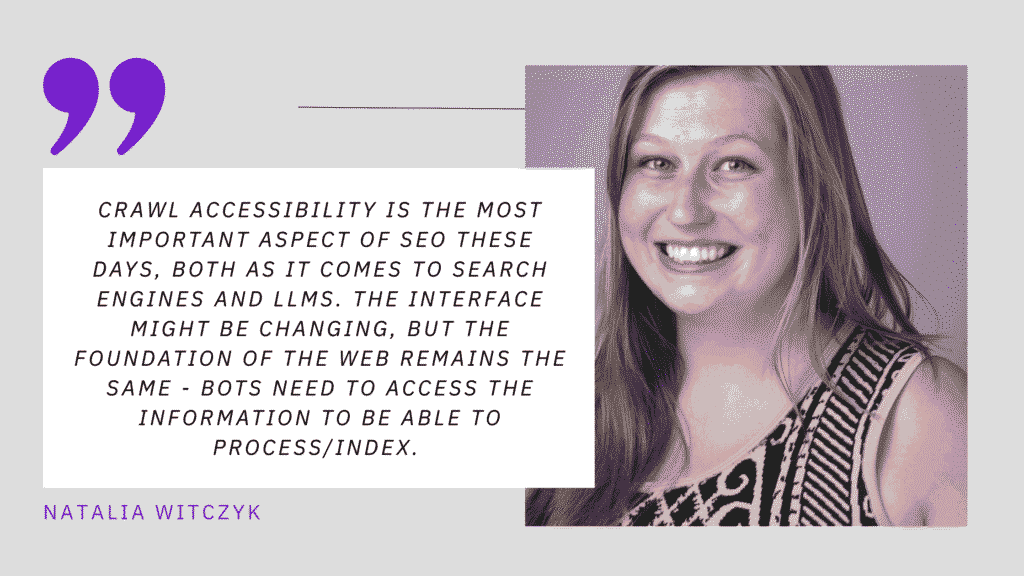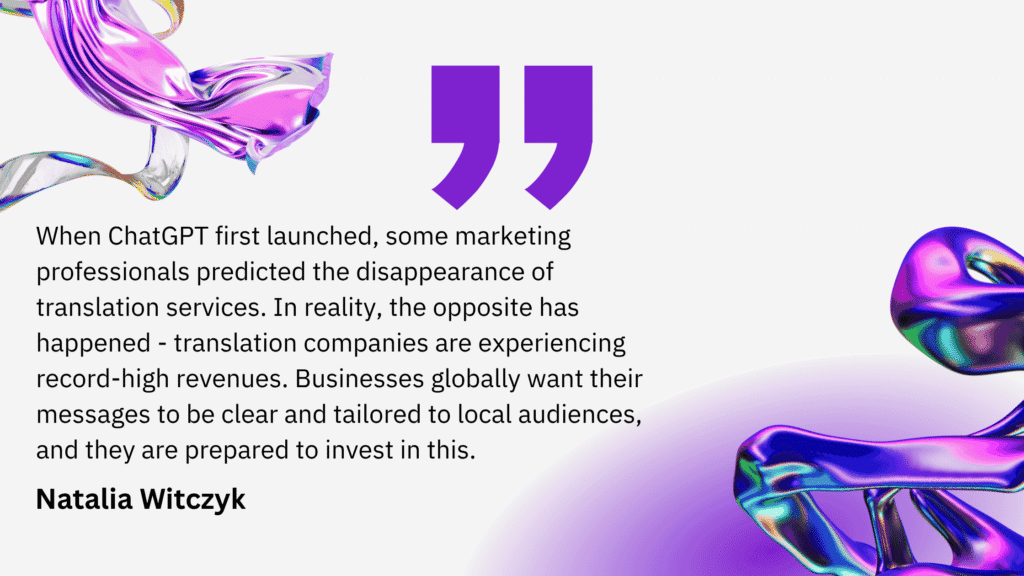About Natalia Witczyk
Natalia Witczyk is an experienced SEO strategist with a proven track record in international search optimization and a true global digital navigator. Featured as a top SEO expert in 2025, Natalia founded Mosquita Digital in Barcelona in 2024, where she crafts international SEO strategies with a deep understanding of technical SEO aspects and multilingual search behavior. Currently immersing herself in the complexities of the Chinese market. She brings rare expertise that sets her apart is her grasp that international SEO goes far beyond simply translating websites. Her strategies are tailor-made to account for cultural nuances and local search behaviors.
Interview -From Technical Issues to Cultural Nuance — What Really Trips Brands Up
Natalia Witczyk’s deep expertise in multilingual SEO, localization, and cross-market search behavior has helped global brands be visible in search in diverse markets while maintaining technical excellence and cultural relevance. In addition to her consulting work, Natalia regularly shares her knowledge at conferences and through thought leadership, helping fellow SEO professionals navigate the challenges of search in multiple regions. In this interview, she will discuss key technical challenges in International SEO—from technical issues to cultural nuance — what really trips brands up.
Q: Thank you Natalia for agreeing to this interview. You’ve worked across multiple countries and languages. Looking back, what was your first major challenge in international SEO, and how did you overcome it?
A: My first major challenge in international SEO came early in my career in the UK. On my very first day at a new job, I was assigned to the largest account I had ever encountered: SAP.com. The agency managed SEO for this domain across 34 markets, a scale I had never experienced. Previously, I worked with small local businesses, managing WordPress sites with only 20 or 50 pages each. Suddenly, I was faced with millions of URLs. The core challenge was to grasp concepts of scalability and business impact. The checklist approach I had relied on in the past was completely inadequate for such a complex project. Domains of this size cannot be analyzed and fixed in their entirety, prioritization is key, every step of the way. This was a significant shock, and it remains my most important learning experience to date.
Q: In general, when websites expand into new markets, what’s the single most overlooked challenge you see — the one that quietly undermines success before anyone notices?
A: International expansion in so much more than just SEO. I see many businesses think that they should launch their international sites first, and figure the rest out later. This might have worked 15 or even 10 years ago, when there was less competition and the entry barrier was way higher, as the localisation was quite expensive and complex. These days, we are saturated with all content, in all languages. This means that businesses need genuine international presence, operations, and brand recognition before investing in international SEO starts to make sense.
Q: As AI reshapes crawling, indexing, and how content is surfaced, what technical foundations become even more critical for international visibility?
A: Crawl accessibility is the most important aspect of SEO these days – both as it comes to Search Engines and LLMs. The interface might be changing, but the foundation of the web remains the same – bots need to access the information to be able to process/index. I believe technical international SEO is a unique specialty of its own, as understanding complex information architecture in multiple languages and markets requires having a certain level of abstract thinking.

Q: International SEO isn’t just about search engines — it’s about people. Can you share an example where cultural misalignment, rather than technical error, completely derailed a campaign?
A: A crucial cultural difference that comes to mind is seasonality. As someone born and raised in the Global North, it’s easy to operate within the same cultural contexts: Valentine’s Day, Christmas, Black Friday. One might even start to believe this calendar is universal all over the world. However, this is not the case for many markets. For example, in China, the biggest event of the year is the Chinese New Year, celebrated in January or February, depending on the lunar calendar. Any website with significant traffic from China experiences huge dips in clicks and impressions around those dates, as the celebrations can last up to 15 days.
Then there are multiple countries where the weekend starts on Friday and finishes on Saturday. These include, for example, Egypt, Qatar, Oman, Saudi Arabia, Maldives, and many more. In practical terms, this means that many B2B global websites see more clicks and impressions on Sundays than on Saturdays, which to an untrained SEO eye might seem out of the ordinary.
To analyze search data from multiple markets and industries, the international context is incredibly important. It helps to make sense of the data.
Q: Many companies equate “translation” with “localization.” Why is this mindset so dangerous, and how do you define true localization when it comes to SEO?
A: To use a modern metaphor, translation is simple, and achievable with a few clicks and an LLM. Localisation, however, needs human input. This is where a native speaker brings their understanding of language and cultural nuance. They make sure that the content is adapted to local realities and sounds natural and authentic to the market and the brand localising their message.
When ChatGPT first launched, some marketing professionals predicted the disappearance of translation services. In reality, the opposite has happened – translation companies are experiencing record-high revenues. Businesses globally want their messages to be clear and tailored to local audiences, and they are prepared to invest in this.

Q: Markets where Google isn’t dominant — Baidu in China, Naver in Korea, Yandex in Russia — bring unique challenges. How should global brands rethink their SEO playbook when targeting these ecosystems?
A: Optimizing for search engines beyond Google requires a complete shift in mindset. Each search engine requires a unique SEO project, with its own tools, processes, and KPIs.
I would even go a step further, and recommend hiring an entirely separate specialist or agency to take care of the markets where Google isn’t the main player. This approach ensures that these “other search engines” are not downgraded to a secondary role, and that the required work receives equal importance and, most of all, equal resource allocation. For example, if the Chinese market is a serious focus, Baidu cannot be treated as a side SEO learning project.
Q: Looking ahead to 2026 and beyond, what’s the next big challenge international SEOs should prepare for — and what practical steps can they take today to stay ahead of it?
Given the increasing volatility of SERPs and the growing variation in SERP features across different markets, staying current and understanding the SERP reality for our websites presents a significant challenge. It will be crucial to connect events like the AI Mode rollout and the “drop” in impressions due to the disappearance of the parameter =100, along with other industry developments, to draw meaningful conclusions from our data.
While the ability to draw conclusions is important, effective communication of these conclusions is absolutely essential. A skilled SEO professional not only has the knowledge but also excels at explaining observations and findings in an accessible way. We must avoid alienating senior stakeholders with new abbreviations or overcomplicating matters, especially in times when the topic itself is already very complex. Our main goal should always be to add clarity, every time we communicate.
Conclusion
Natalia Witczyk reminds us that international SEO is one of the most misunderstood — yet most rewarding — disciplines in digital marketing. It’s not about replicating the same strategy in multiple languages, but about adapting intelligently to new cultural, linguistic, and technical realities.
Her insights cut through the noise: translation is not localization, and visibility starts long before optimization begins. Whether it’s understanding local seasonality, building crawl accessibility for multiple markets, or adjusting strategy for non-Google search engines like Baidu and Naver, Natalia’s message is clear — successful global SEO depends on clarity, context, and cultural awareness.
In an era where AI and automation make expansion seem easier than ever, Natalia’s perspective is a timely reminder that the hardest challenges in international SEO are still human — and solving them requires more than just code and keywords.




